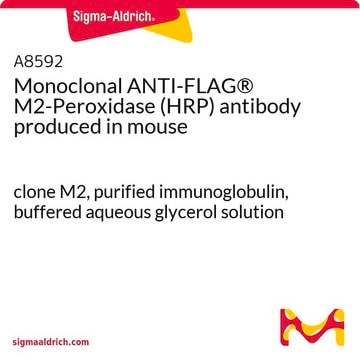V2260
Monoclonal Anti-V5-Peroxidase antibody produced in mouse
clone V5-10, purified immunoglobulin, lyophilized powder
Sinónimos:
Monoclonal Anti-V5
About This Item
Productos recomendados
biological source
mouse
Quality Level
conjugate
peroxidase conjugate
antibody form
purified immunoglobulin
antibody product type
primary antibodies
clone
V5-10, monoclonal
form
lyophilized powder
packaging
vial of 0.5 mL
concentration
5-11 mg/mL
technique(s)
western blot: 1:4,000-1:8,000
storage temp.
2-8°C
¿Está buscando productos similares? Visita Guía de comparación de productos
General description
Specificity
Application
Physical form
Preparation Note
¿No encuentra el producto adecuado?
Pruebe nuestro Herramienta de selección de productos.
signalword
Warning
hcodes
Hazard Classifications
Skin Sens. 1
Storage Class
12 - Non Combustible Liquids
wgk_germany
WGK 2
flash_point_f
Not applicable
flash_point_c
Not applicable
Certificados de análisis (COA)
Busque Certificados de análisis (COA) introduciendo el número de lote del producto. Los números de lote se encuentran en la etiqueta del producto después de las palabras «Lot» o «Batch»
¿Ya tiene este producto?
Encuentre la documentación para los productos que ha comprado recientemente en la Biblioteca de documentos.
Nuestro equipo de científicos tiene experiencia en todas las áreas de investigación: Ciencias de la vida, Ciencia de los materiales, Síntesis química, Cromatografía, Analítica y muchas otras.
Póngase en contacto con el Servicio técnico









